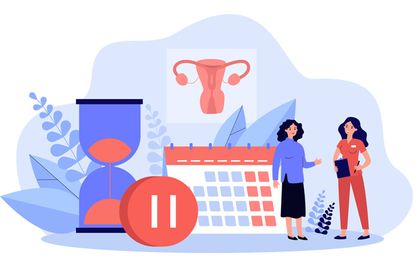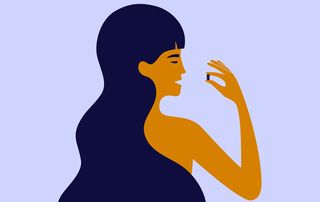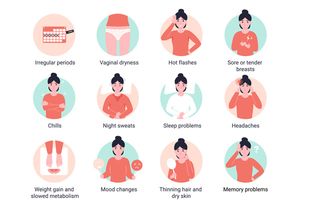What are the stages of the menopause? Pre, peri, post and menopause explained
As women, we battle against our hormones, arguably from our teenage years through to older age. And there are waves to overcome in later life, in the forms of perimenopause, menopause and postmenopause.


There are different stages of menopause and each one brings its own unique challenges.
You may not have realised that there are four stages of menopause. These are pre-, peri-, meno- and postmenopause. Premenopause is when women are at their most fertile, while perimenopause is when women are most likely to experience menopausal symptoms (and when you'd benefit from the right menopause diet). During this period, almost two-thirds of women will have symptoms – from bloating to tiredness – and some women will continue to have, or even develop, symptoms in the postmenopause stage.
For most women, menopause occurs between the ages of 45 and 55 years – the average age for women in the UK around 51 years – although some women may experience early menopause. We asked sexual and reproductive health specialist Dr Deborah Lee and senior health practitioner Claire Snowdon-Darling about the stages of menopause, what you can expect, and what treatments and support are available to help.
What are the stages of menopause?
- Premenopause
- Perimenopause
- Menopause
- Postmenopause
Premenopause
When does premenopause happen?
'When we refer to premenopausal women, we generally mean women who are under 40, whose ovaries are working normally, and hence they have their own oestrogen,' explains Dr Lee of Dr Fox Online Pharmacy. 'This stage refers to women during their reproductive years when their menstrual cycles are taking place and they're ovulating – before menopause begins.'
'There aren’t necessarily four stages of menopause, there are four life stages of women post-puberty,' says Claire. 'Premenopause is the time from our first period until we start to go into perimenopause,' she explains.
Premenopause symptoms
You won't have menopausal symptoms during premenopause, although it's possible you may have trouble conceiving. If you're not trying for a baby you'll need to use contraception.
If you start to experience menopausal symptoms before the age of 40 you may be having an early – or premature – menopause. 'A menopause before the age of 40 (some say age 45) is premature menopause, or premature ovarian failure (POF),' says Dr Lee. 'This is a distinct medical condition and is a different situation compared to women who go through menopause at the usual time.'
GoodtoKnow Newsletter
Parenting advice, hot topics, best buys and family finance tips delivered straight to your inbox.
Treatments and support
If you do have premature menopause (click here to read about three women's experiences) there is help available. 'Women with POF need specialist support – see the Daisy Network for advice and help,' says Dr Lee. 'Without adequate oestrogen replacement, they will live their lives with at least 10 years less oestrogen than women who have gone through normal menopause. This puts women with POF at a significantly increased risk of heart disease and osteoporosis,' she explains.
'Women with POF will generally always be advised to take HRT until the age of 50/51. Any woman who has POF needs to take this advice without delay and shouldn't be put off by scaremongering reports about HRT,' she says.

Perimenopause
When does perimenopause happen?
This is when you can expect to get menopausal symptoms. Rest assured, you won't be alone on your perimenopausal journey – 13 million women in the UK are either peri- or postmenopausal and symptoms can last up to 15 years.
'Perimenopause and menopause are used interchangeably,' says Claire, founder of Balanced Wellness. 'But until we have missed 12 periods we're still perimenopausal. If we only miss 10 and then have a period the clock resets,' she explains. 'This is why perimenopause and menopause are quite hard to quantify. These should happen in our 50s but many women experience symptoms in their late 30s and early 40s.'
Perimenopause symptoms
- Hot flushes
- Night sweats
- Fatigue
- Headaches
- Irregular periods
- Trouble sleeping
- Mood changes
- Anxiety/depression
- Vaginal dryness
- Low libido
- Weight gain
- Thinning hair
- Dry or itchy skin
- Chills
- Sore or tender breasts
- Loss of breast fullness
For most women, this is the most difficult of the different stages of menopause. 'Perimenopause is the time when menopausal symptoms are at their worst,' says reproductive health specialist Dr Lee.
Symptoms can vary wildly and it's only in recent years that we've become more aware of how much of an effect declining hormone levels can have on our bodies and minds.
Dr Lee explains: 'It’s often helpful to think about what's happening physiologically. Perimenopause is a period of slowly declining ovarian activity. Over time, the ovaries become resistant to the effects of follicle-stimulating hormone (FSH) and hence FSH levels rise, but ovulation fails to occur, and oestrogen levels are low. As the body tries to overcome the problem, hormone levels can be very unpredictable. This precipitous rise and fall in hormone levels are thought to somehow underlie the development of hot flushes and night sweats.'
While some women are fortunate enough to sail through this period virtually symptom-free, most of us won't be so lucky. Aside from the physical symptoms, studies show that almost half of us will feel depressed and a third will suffer from anxiety.

Then there are the more surprising symptoms. 'The least well known are lack of confidence (often irrational, for example, or suddenly being afraid of driving for no reason), constant repetitive thoughts, itching scalp, sudden onset of food intolerances, burning tongue, memory loss and forgetting words,' says Claire.
Talking of forgetfulness (which often comes under the 'brain fog' umbrella), the good news is that it's temporary. 'In one 2013 study, 117 women at different stages of the menopause were asked to undertake psychometric testing. Women in the early stage of menopause performed significantly worse than women in the later stages, in tests of cognition, verbal learning, verbal memory, and working memory tasks,' says Dr Lee. This indicates that these symptoms do diminish over time.
We'll also possibly start to feel like we look older. 'Collagen may reduce by as much as 30% in the first five years of perimenopause, due to lack of oestrogen,' says Dr Lee. 'This results in slow-growing, weak and brittle, hair and nails, and dry, ageing skin, along with wrinkles and fine lines.' Although research is mixed, you could try taking a collagen supplement such as Cosmic Molecule Collagen Peptides Powder (£24.99, Amazon) – the likes of which can improve hair, nails, skin, joints and energy levels.
And contrary to popular belief, you can still be going through perimenopause even if your periods are regular. 'We can experience symptoms in some cases 10 years before bleed destabilisation [irregular periods], which is why these symptoms are so often overlooked as perimenopausal,' warns Claire.
You can also get pregnant right up until the day you reach menopause. 'Women should continue to use contraception until they have had no periods for 1 year over the age of 50, or no periods for two years under the age of 50, or they are aged 56 or older,' says Dr Lee. 'HRT does not provide contraception!'
Treatments and support
If any of your symptoms are affecting your life it's essential you get support. GPs are getting better at understanding what women go through during various stages of menopause, but if you don't feel like you're being heard, or your symptoms are being dismissed, don't be afraid to change doctors or see a menopause specialist.
'A recent 2021 research study showed that 1 in 10 women have suicidal thoughts when going through menopause,' says Dr Lee. While this is worrying there is help out there, she says. 'Successful treatment may necessitate both the use of antidepressants (SSRIs) and hormone replacement therapy (HRT).'
HRT can help with many symptoms. 'Don't be scared of HRT,' says Dr Lee. 'In the past 10-20 years HRT was bashed by the press. However, the claims that were made about it were exaggerated. The tide of opinion has now firmly swung the other way. For the vast majority of healthy perimenopausal women, HRT is likely to confer benefit and not harm.'
HRT isn't suitable for everyone, so your doctor will determine if you're a suitable candidate. If you can't or won't use HRT you could consider bioidentical hormone therapy, which is plant-based. Many women have had great results using this 'natural' version; however, the industry isn't regulated. As a result, it's currently discouraged by the NHS.
Whether you take HRT or not you need to keep yourself fighting fit. The NHS recommends exercise, a healthy diet, giving up smoking, alcohol, caffeine and spicy food, and reducing your stress levels to help minimise and manage symptoms. Cognitive Behavioural Therapy (CBT) can be very useful and there are also certain medications that can help with particular symptoms as well as herbal supplements such as:
- Ashwagandha
- Chaste
- Maca powder
- Red clover
- Rhodiola
- St John's wort
N.B. Always check with a practitioner before using herbs.
Menopause
When does menopause happen?
As Claire said previously, we use the terms menopause and perimenopause interchangeably. In truth, we don't really go through menopause – we reach it.
'Menopause is the date of the final period,' says Dr Lee. 'However, this is a retrospective event, and we cannot know in advance when this will be.'
Menopause symptoms
- Period stop
- Hot flushes
- Night sweats
- Fatigue
- Headaches
- Irregular periods
- Trouble sleeping
- Mood changes
- Anxiety/depression
- Vaginal dryness
- Low libido
- Weight gain
- Thinning hair
- Dry or itchy skin
- Chills
- Sore or tender breasts
- Loss of breast fullness
Aside from the complete cessation of your periods, how you respond to reaching menopause depends on a variety of factors.
'It is a very individual experience and anything can be possible,' says Claire. 'Some women sail through the menopause transition and feel horrendous for a few years afterwards. Others struggle for a long time then pop out the other side. There really isn’t a one size fits all, which is why we need more education for women and the medical practitioners supporting them.'
Treatments and support
If you feel OK, congratulations! You reached menopause and lived to tell the tale. You may feel good – some women say they feel liberated after half a lifetime of periods – or you may continue to experience symptoms, or some new ones may appear. If you have any concerns, or unexplained bleeding after your periods have stopped, see your doctor or a menopause specialist.
Postmenopause
When does postmenopause happen?
'This is the time after the very last period,' confirms Dr Lee. 'It usually begins in women aged over 50, but as periods may continue to age 56 or 57, many women are not postmenopausal until their late 50s or early 60s,' she explains.
In the last of the stages of menopause, women who have reached this point won't have another period but may still have symptoms.
'Perimenopausal symptoms often continue for several years after the last menstrual period, meaning they can continue until a woman is in her mid to late 50s,' says Dr Lee. 'In fact, 5% of women have vasomotor symptoms (VMS), such as night sweats and hot flushes, for life.'
Postmenopause symptoms
Oestrogen decline/deficiency continues after menopause and the outcome can be difficult for some.
'Women can develop symptoms at any time after menopause,' says Dr Lee. 'It's unusual, but older women can develop hot flushes for the first time due to oestrogen deficiency.'
'Low oestrogen levels also give rise to urinary symptoms, and vaginal dryness and soreness, and that can mean sex is uncomfortable or painful. This is why many postmenopausal women still need help to control their symptoms,' she says.
The decline of these protective female hormones affects other areas of our bodies, too. 'Older women are also more likely to get symptoms of heart disease, or osteoporosis. Osteoporosis is a silent killer. Women are thought to lose around 10% of their bone density in the first 5 years after menopause. This is painless, and they only often know this has happened when they have a fracture. They may get back pain from a sudden vertebral fracture, or fall and fracture a hip, for example,' she explains.
You may suffer from fatigue, too. While this is a relatively common symptom throughout life, it's particularly apparent in postmenopausal women. 'In a 2018 cross-sectional study of 300 women at different stages of menopause, fatigue was increasingly common as the menopause transition progressed,' says Dr Lee. 'Fatigue was present in 19.7% of premenopausal women, 46.5% of perimenopausal women and 85.3% of postmenopausal women.'
Dr Lee adds: 'Low oestrogen levels can also affect the levels of other hormones such as cortisol and thyroid hormones, all of which can contribute to tiredness. Poor sleep and lack of sleep are also factors.'
Treatments and support
If vaginal dryness is problematic there are options. 'Almost everyone can use topical oestrogen, such vaginal oestrogen cream (Ovestin) or pessaries (Vagifem) in the vagina,' says Dr Lee.'Even women who are taking substantive HRT, either as a tablet or a patch, can safely use topical oestrogen.'
If low bone density is an issue, HRT can help – though it's not the only option. 'Alternatives include bisphosphonates, which are very effective at preventing and treating bone loss and helping prevent fractures,' advises Dr Lee. 'Your GP will advise you.'
If your doctor gives the go-ahead, you can stay on HRT after you've reached menopause. But as well as these medical treatments, lifestyle changes are key to managing your postmenopause life.
'Stay really healthy by eating a diet that balances your blood sugars with enough protein and essential fat for heart and digestive health,' says Claire. 'Exercise regularly, ideally using weight resistance [such as small weights] to avoid bone density depletion, and consider supplements such as magnesium, which is good for hormone balancing.'
How long does it take for menopause to end?
The average age of menopause – the final period – is around 51, but there is a great range of normality,' says Dr Lee. 'Rarely, women can still have periods at 57,' she says, but the majority of women will reach menopause in their early 50s. Although menopause officially ends at this point, it's wise to anticipate ongoing or new symptoms.

Debra Waters is an experienced online editor and parenting writer. She also has a strong background on health, wellbeing, beauty, and food. She currently writes for Goodto and Woman&Home, and print publications Woman, Woman’s Own, and Woman’s Weekly. Debra has written for What to Expect, Everyday Health, and Time Out. In addition, she has had articles published in The Telegraph and The Big Issue.
-
 Worried about your teen 'being smelly'? They can't help it, according to scientists, and help is on its way to ease the problem
Worried about your teen 'being smelly'? They can't help it, according to scientists, and help is on its way to ease the problemWe know that puberty can cause all sorts of smells to emanate from teens - now scientists have revealed exactly what you're smelling, and how evolution contributed.
By Lucy Wigley Published
-
 Parenting coach shares 4 'powerful' reframes to try next time it feels like your kid is pushing all your buttons (and #4 is a game changer)
Parenting coach shares 4 'powerful' reframes to try next time it feels like your kid is pushing all your buttons (and #4 is a game changer)A parenting coach has shared four ways parents can reframe their thoughts when their kid has big emotions. Giving them a try could offer big results in little time.
By Lucy Wigley Published